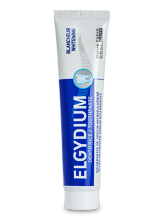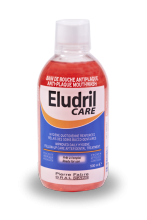Sensitive gums: A warning sign
The issue of sensitive gums
Sensitive gums are a common health concern
Many adults and young people are thought to suffer from gum problems, with the majority of them not even realising it. This is because gum problems tend to develop slowly and without symptoms for a long time.
However, when the problem is diagnosed, people often recall incidents of hypersensitive gums or even occasional slight bleeding.
Sensitive gums, a discomfort that should not be ignored
Hypersensitive gums are most often related to inflammation (gingivitis). This takes the form of swelling, a dark pink or even red colouring, slight bleeding and sometimes bad breath. Brushing becomes tricky and it may make chewing difficult too.
Having sensitive gums without an identified reason should be a wake-up call as it may be a sign of more serious damage. Healthy gums are pinkish in colour and do not bleed from minor contact.
The complications of sensitive gums
Gingivitis, which is often the cause of hypersensitive gums, can develop into periodontitis, an infection of the tissues that attach the teeth to the jaw. This must be treated without delay. Gingivitis is reversible once it is diagnosed and treated, unlike periodontitis which is irreversible. Any destruction of the tissues holding the teeth can never be completely corrected, even if recent developments in dentistry have made considerable progress in this field.
The causes of sensitive gums
Dental plaque and sensitive gums
In the vast majority of cases, hypersensitive gums are related to an underlying gum problem. The inflammation of the gums is a reaction to an accumulation of dental plaque, a film of bacteria that builds up on the teeth and in the spaces between the teeth and gums.
When dental plaque is left in place, it solidifies and forms an environment in which various bacteria can flourish, protected from the toothbrush. These deposits are most often at the base of the teeth (where they enter the gum), in areas on which the tongue and cheeks do not rub on the tooth surface, in the spaces between the teeth, and around dental prosthetics or braces.
In the instance of poor dental hygiene, the bacteria that proliferate in the dental plaque cause an immune response that will affect the gum which is called gingivitis.
Tobacco, alcohol and sensitive gums
Smoking and excessive consumption of alcoholic drinks, which are often high in sugar, may exacerbate dental plaque and tartar formation because they can dry out the mouth and upset the delicate balance of bacterial flora.
Hormonal fluctuations and sensitive gums
A hormonal imbalance is a factor that can worsen tartar and dental plaque and therefore lead to hypersensitive gums. This is particularly common in pregnant women but also for some women in the days leading up to ovulation.
Other causes of sensitive gums
Some diseases and medical treatments may contribute to gum hypersensitivity by drying out the mouth, this is the case for many anticancer treatments.
Unsuitable dental prosthetics or braces may also be the cause of gum pain.
What is your Gum Potential?
Gums are susceptible to the effects of ageing
We each have a Gum Potential which is the overall potential health of our gums. It is at its maximum in the first years of life and can, at best, be maintained at that level.
Without the best oral hygiene, age can adversely affect the health of your gums and problems such as loose teeth might occur if periodontitis sets in.
Avoiding irreversible damage to the gums
Once the Gum Potential has been affected, the clock cannot be turned back. If periodontitis is left neglected for too long, the Gum Potential will be permanently damaged. It is therefore essential to safeguard it with preventive measures and suitable care. To maintain this Gum Potential, simple and regular oral health routines are generally all that is required, along with the use of suitable oral health products.
How can Gum Potential be maintained?
1. Meticulous brushing and good interdental hygiene.
Gum health is best protected by limiting dental plaque and can be done by following these steps:
- Brushing your teeth twice a day.
- Ensuring the spaces between the teeth are kept clean, using dental floss or interdental brushes, once a day.
- Using a cleansing mouthwash every day, to reach the areas left untouched by the toothbrush, floss and interdental brush.
*Remember to be gentle on the gums to avoid damaging them.
2. Choose an ultra-soft toothbrush.
Some toothbrushes are specifically designed to be gentle on gums. Look out for toothbrushes that intended for use after mouth surgery.
3. Dental floss, interdental brushes and mouthwash.
To eliminate dental plaque in the spaces between the teeth, you can use interdental brushes, dental floss, followed by a mentholated mouthwash, like ELGYDIUM ENAMEL PROTECTION, to soothe sensitive gums and complete the oral hygiene routine in areas that are impossible to reach with brushing or flossing methods.
4. Gel toothpaste.
A gel toothpaste is less abrasive to the enamel and gums. ELGYDIUM SENSITIVE toothpaste is a good alternative and contains fluoride to strengthen the enamel and act on dental plaque.
5. Regular visits to the dentist.
Only the dentist can remove tartar, so it is essential to consult your dentist at least twice a year, or at the first sign of gingivitis. Your dentist will also be able to measure the distance between the edge of the gum and the tooth attachment point, to detect signs of periodontitis.

